Partners in Advocacy: Drink Sustainably with Fat Tire
Photos courtesy of New Belgium
POW and Fat Tire are long time friends and partners which is why we’re stoked to feature the brand as our August Partner in Advocacy! The brand has long understood that it can utilize its platform and voice to both raise awareness and inspire action around sustainability as well as advocate for policies that address a changing climate. Brewed by New Belgium, Fat Tire has been a committed and impactful partner by amplifying POW campaigns, developing collaborative campaigns, joining us on Capitol Hill for POW Action Fund Lobby Days and leveraging the voices of shared Athlete Alliance members. Fat Tire is the perfect example of how a brand can utilize its platform to ignite change by incorporating advocacy into its product and brand.
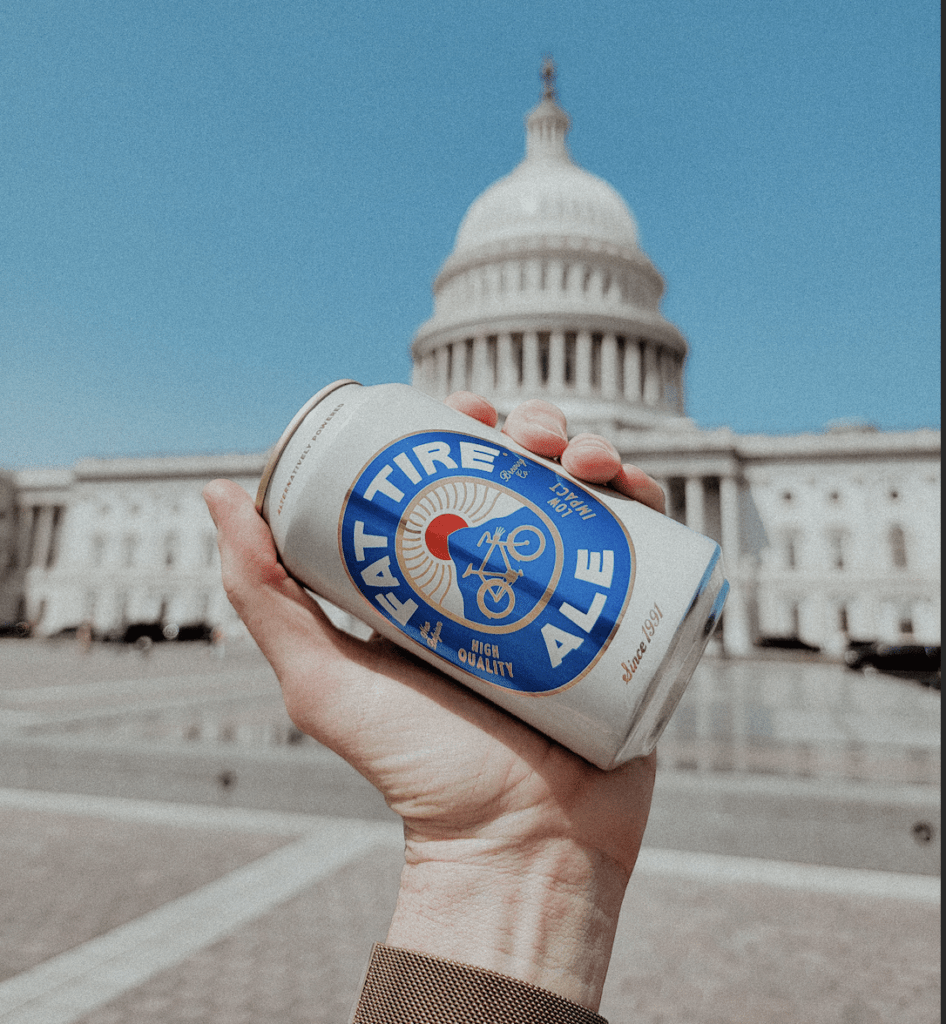
Drink Sustainably – America’s First Climate Neutral Beer
From drought decimating barley and hop yields, to wildfires filling rivers with ash, to intense cold snaps affecting nationwide supply chains, climate change is impacting beer today. This reality is precisely why Fat Tire and the folks at New Belgium have been working strategically for decades to mitigate their carbon footprint, as they work to achieve science-based carbon reduction goals.
“If you break it down, beer is just crops and water, and both of those things are significantly impacted by a changing climate,” said Taylor Boyd, Fat Tire’s Brand Manager. “For our business, climate change is having real measurable impacts. We would be pretty silly to not take a stand against what is detrimental to our business.”
The road map to get to where the brand is today in terms of sustainability and carbon footprint was laid out in the late eighties, before New Belgium was an actual business. At the time, the brand’s co-founder Jeff Lebesch was still brewing beer in his basement, trying to do so with the least amount of energy possible. Since then, the brand has continued to find new ways to reduce its footprint within its own infrastructure and supply chain.
While brewing the first batch of Fat Tire in 1991, Lebesch rigged up a trash can and copper pipe which captured and reused wasted heat, to reduce energy demands. Today, the company has implemented the same basic concept on a much bigger scale at each of its production breweries and has continuously evolved its practices in order to lower the environmental impact and energy use associated with production.
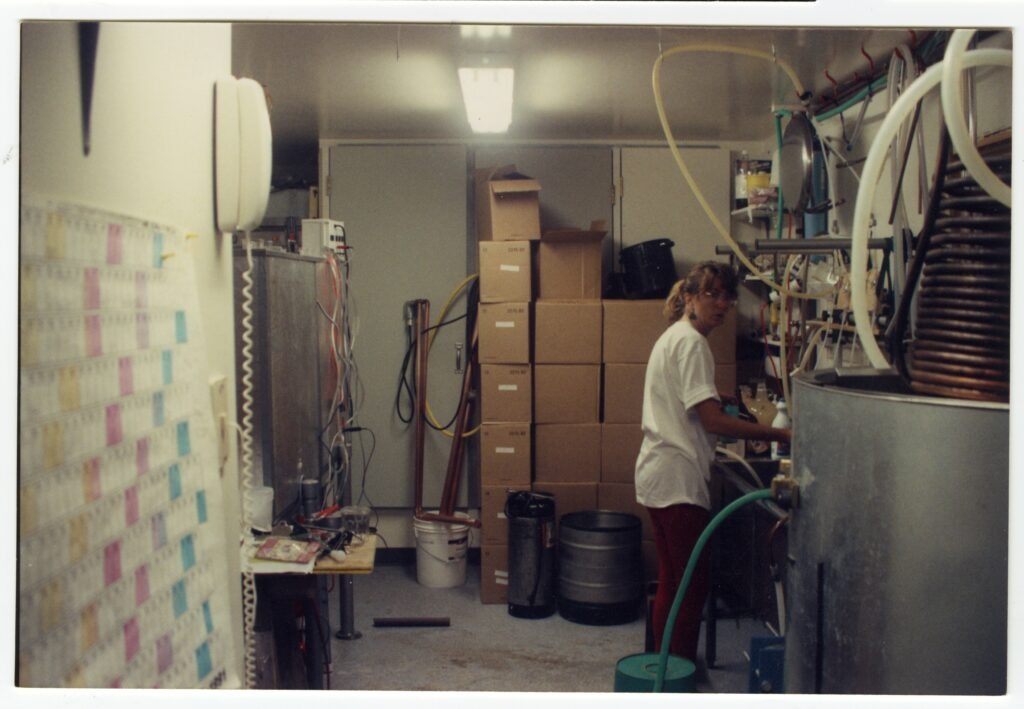
Beyond a focus on energy efficiency, the brewery also generates renewable energy from solar, solar thermal and biogas—which New Belgium captures from onsite wastewater treatment and turns into renewable electricity for the brewery. The company also focuses a great deal on minimizing the impact of every big link in its supply chain—from reducing the weight of packaging to minimizing the fuel required to haul beer on a truck, to starting a coalition dedicated to expanding glass recycling infrastructure, to investing in climate-resilient barley breeding.
This road map, along with Fat Tire’s advocacy and philanthropy efforts, can be found front and center in its branding. In fact, the brand has a website dedicated to the work it’s doing in the space called drinksustainably.com.
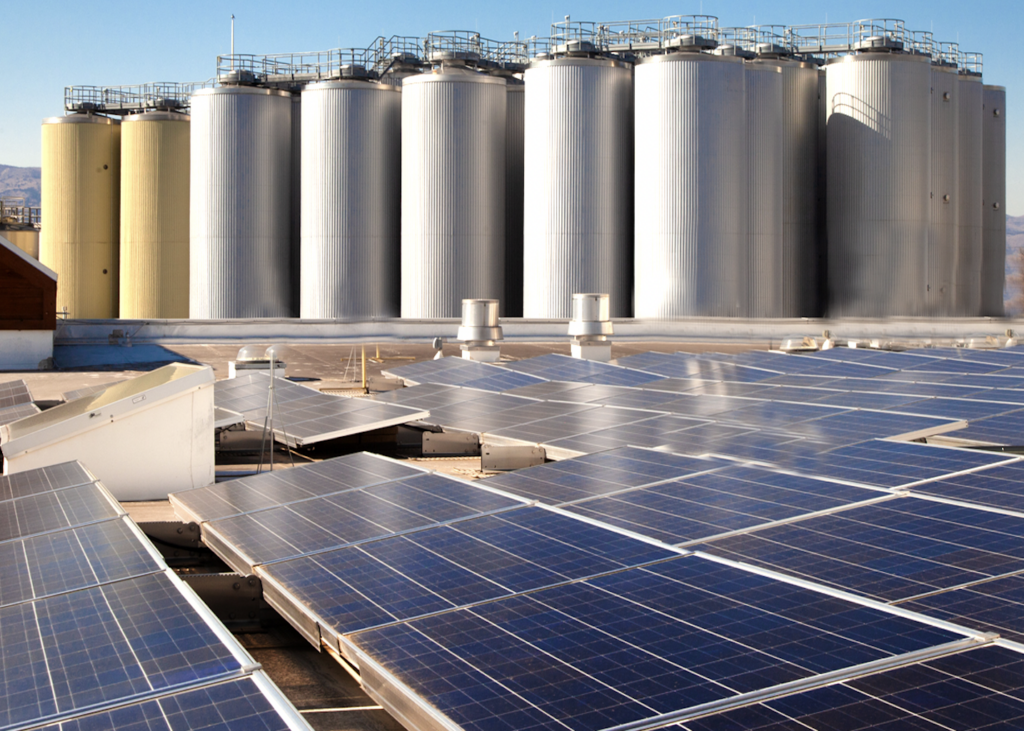
“Drink Sustainably is a hub for those who are interested to learn more about how climate change impacts beer and understand what we’re doing as a business—in our operations, supply chain and through our advocacy work—to fight against,” said Boyd. “It’s a resource for people who are curious about the work we’re doing and want to get involved.”
On the website the user can find everything from the footprint required to brew beer down to information on the type of packaging used. There’s also in-depth information on why climate action matters, what clean energy investments the brand is making and how beer drinkers and the beer industry alike can help make an impact.
“The reality is that we could cut our emissions down to absolute zero, and in the grand scheme of things it wouldn’t matter. We need the largest businesses in this game with us,” said Boyd. “And we need action at the federal and global level.”
Taylor Boyd
As a self-described medium-sized company, Fat Tire is a role model for both smaller and larger brands, and offers up an open-source toolkit on drinksustainably.com to share what they’ve learned about how to reduce their climate impact. “It’s a way for other businesses, particularly within the beverage industry, to begin making assessments on their own footprint and identifying means to chip away at it,” said Boyd.
Boyd believes that the big players in the industry are critical in creating change at the scale necessary to address climate change. He cites returnable programs that exist in other countries but have not been implemented in the United States. “Packaging represents a massive portion of our footprint and using returnables to create a more circular economy with beverage packaging industry-wide would be a pretty major milestone,” said Boyd.
While Fat Tire is doing a dang good job at being a leader in the climate and sustainability space, the company believes that even after more than three decades of this work, they’ve barely scratched the surface and are constantly looking toward what’s next as new technologies and solutions evolve. Just earlier this summer, New Belgium announced that it’s piloting a new electrified boiler at its Fort Collins brewery to reduce natural gas usage, working with a local start-up with ties to Colorado State University.
Thinking beyond the carbon emissions of beer, the company also invests in accelerated global decarbonization by purchasing high-integrity carbon offsets. “Our priority is always in reducing our own footprint, but we continue to seek out high-quality offset projects that represent an investment in a decarbonized future,” said Boyd.
Fat Tire is supporting projects that not only mitigate climate change, but also benefit society through education, job creation and economic resilience—ensuring a better future for people and beer.
POW x Fat Tire/New Belgium
While New Belgium was implementing sustainability initiatives internally to help keep its carbon footprint low and working toward the certification of Fat Tire becoming carbon neutral, the brand also got serious about pushing for climate policy.
In order to meet the brand’s carbon reduction goals, Fat Tire understands that systemic change is needed across the economy—from a clean energy grid to tap into, to zero-emission trucks for shipping beer. “We know we’re infinitely better positioned to reduce our own footprint with the proper regulations and programs in place,” said Boyd.
This shared interest in affecting change through systemic action is one of the key reasons that Fat Tire has been partnering with POW for almost a decade now. Together, we can help ignite change and amplify voices of both the Outdoor State and beer drinkers alike.
During the 2022 Winter Olympics, New Belgium created an IOC petition called Climate Action Before Ads. This petition brought attention to the fact that many of the top sponsors of the Olympics had no plans to address climate action. While millions of dollars were being spent on advertising, the future of theWinter Olympic Games remains in jeopardy. The campaign ran alongside a special release beer, Point of Snow Return, which showcased a ski racer skiing on top of a melting snowpack. The campaign received thousands of signatures at a moment when climate action was on the world stage, helping to create momentum and buzz.
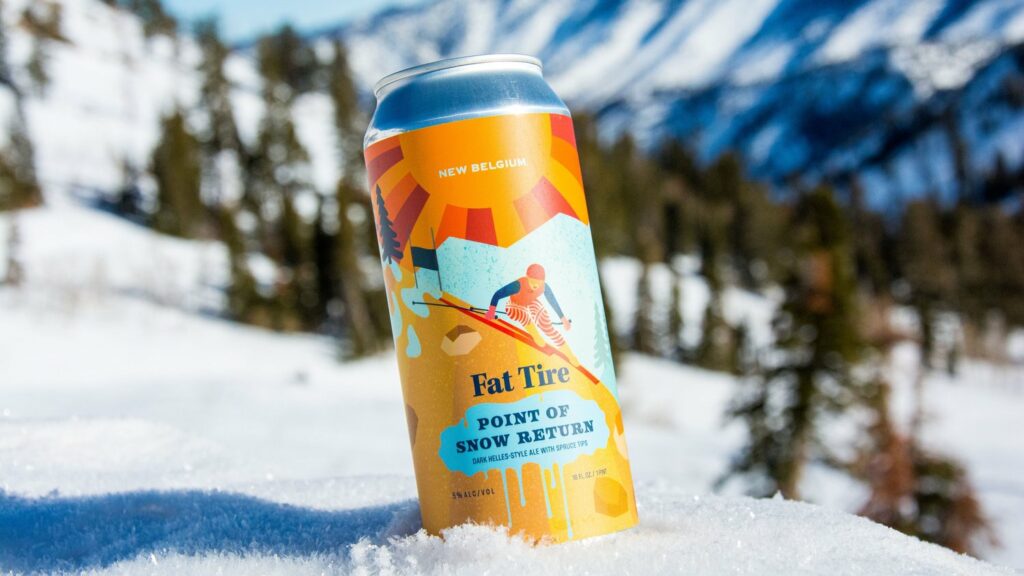
One of our favorite POW x Fat Tire creations was the Torched Earth beer. Through both the imagery on the can and the flavors inside, it tangibly depicted what beer would taste like in the face of climate change. And guess what? It wasn’t very good.
“That idea of that campaign was to highlight the impact of climate change on beer by brewing this sort of imaginary beer from a future we hope we never arrive at,” said Boyd, “ If climate change goes unchecked, it will have negative implications for the beer we drink much like it will have negative effects on the places in which we recreate. That beer was this tangible example of why we need to take action.”
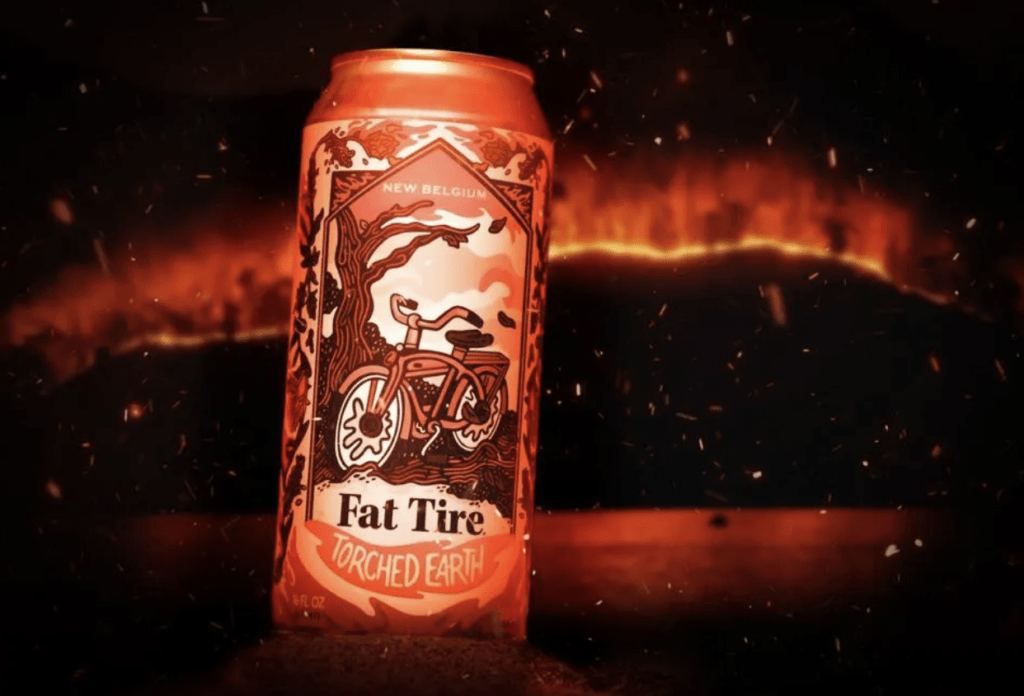
The ingredients reflected what would be available in a landscape ravaged by climate change. Intentionally brewed to produce off flavors, like smoke, the beer simulated the impact of fiercer and more frequent wildfires on crops and our water supply. Instead of barley, which would be difficult to grow amidst rising global temperatures, Fat Tire substituted shelf stable concentrates made from various grains, which gave the beer a rather funky taste. Dandelions were used as the bittering agent in place of hops, which are also being negatively impacted by climate change.
It’s not surprising, given our shared values, that many of POW’s Alliance members also work with Fat Tire. Together, we collectively work with Alliance members, including Forrest Shearer, Len Necefer, Dillon Osleger and Mike King to amplify the voices of the Outdoor State and advocate for climate action.
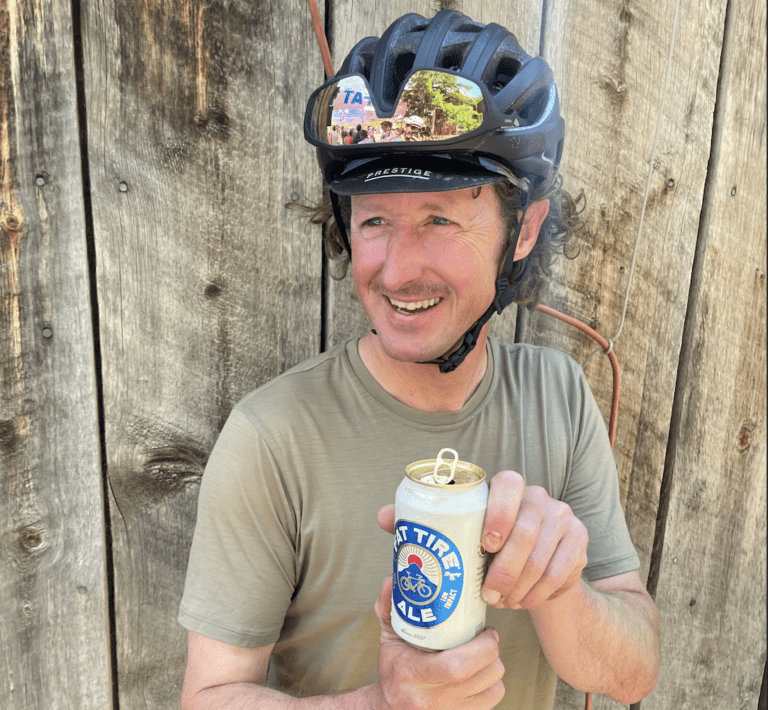
“These athletes are spending so much time in environments being directly impacted by a changing climate,” said Boyd. “They have a relevant and credible platform to stand on when it comes to speaking on climate change.”
Using athletes as spokespeople on the subject of climate change not only helps get the word out, but it adds some element of hope and inspiration to take action. “They’re often uniquely able to present the conversation in a way that doesn’t feel hopeless but offers a sense of optimism,” said Boyd.
POW is fortunate to have a partner like Fat Tire working toward the shared goal of mitigating the impacts of climate change through clean energy and advocating for change at the federal level. With their support we’re able to have a larger impact and create positive momentum toward reaching our climate goals of carbon neutrality by 2050. To learn more about Fat Tire’s climate initiatives, visit drinksustainably.com

Author: Stacie Sullivan
Stacie always knew she wanted to pursue a career in the ski industry from a young age, having first clicked into skis at the age of 4 and writing her 8th grade career project on being a professional skier. While her dreams of becoming a professional athlete didn’t quite pan out the way she planned at […]
